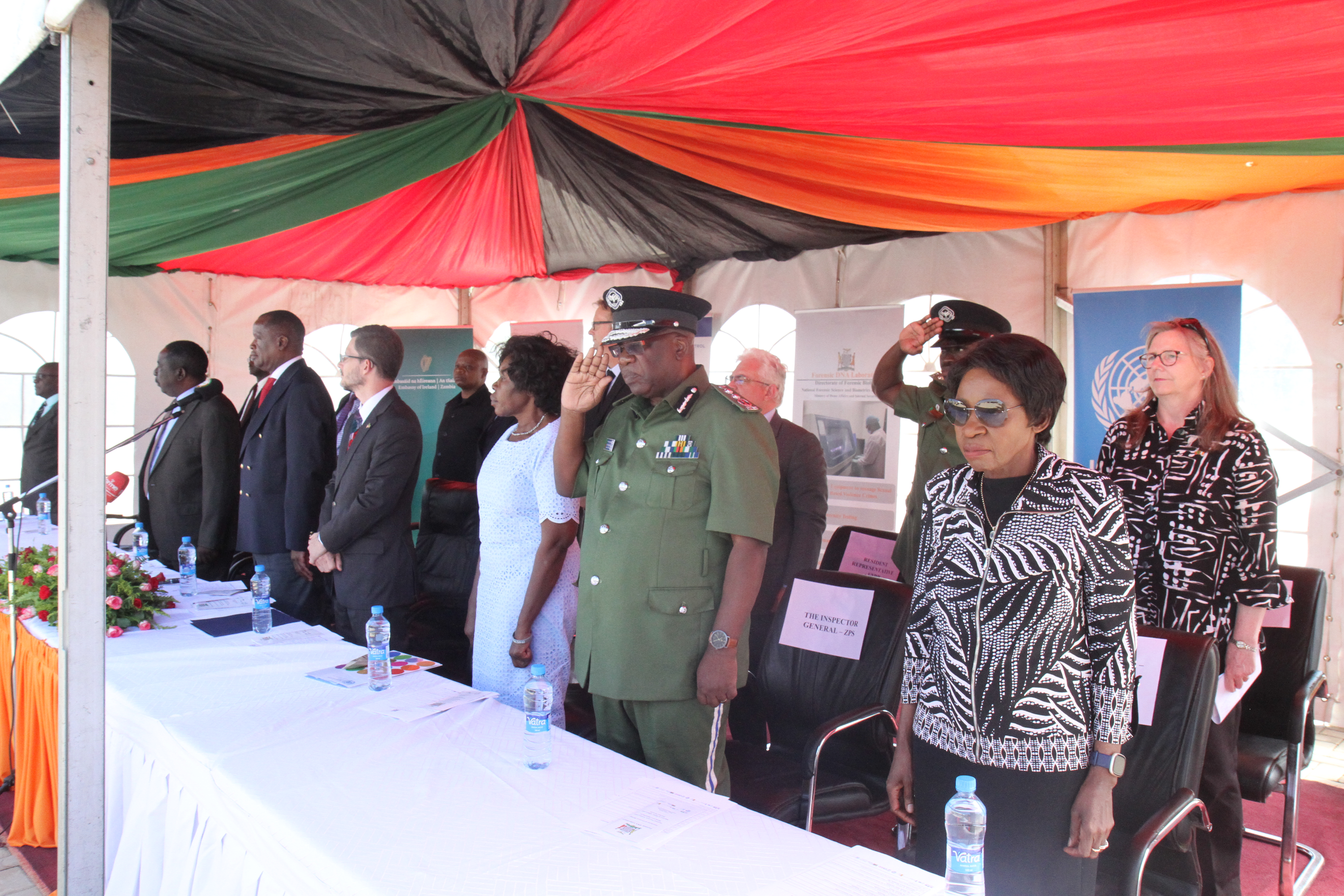Finally Launched – Forensic DNA Lab to Bridge Unresolved GBV Cases
May 18, 2023

Officials from the Ministry of Home Affairs and Internal Security, the Zambian Police Service, the Governments of Ireland and the United States of America and GRZ-UN Joint Programme on Gender-Based Violence, at the Launch of the Forensic DNA Testing Lab in Lusaka
Lusaka, 18 May 2023 – The Ministry of Home Affairs and Internal Security, in partnership with the United Nations in Zambia, and supported by the Government of the United States of America, has launched a Forensic DNA Laboratory under the National Forensic Science and Biometrics Department that will offer the state-of-the-art analysis of DNA evidence in the resolution of sexual and other violent crimes, especially those perpetrated against children, women and other vulnerable groups.
Speaking at the launch on 16 May, the UN Resident Representative, Ms Beatrice Mutali said, “the establishment of this DNA Lab is a big and important step in our efforts to decrease the number of genuine cases lost in the judicial system as DNA is a powerful investigative tool. Therefore, strengthening the forensic system in Zambia is a big gamechanger for women and girls who fall victim to sexual offences.”
The lab, which will be hosted by Levy Mwanawasa Medical University (LMMU), is the missing link in many sexual and gender-based violence cases in Zambia. The forensic DNA evidence will annul the major setbacks in obtaining much-needed justice for survivors of rape and Gender-Based Violence (GBV). With the establishment of the Forensic DNA laboratory, witness and survivor statements regarding the crime will now be corroborated by the DNA evidence.
The Minister of Home Affairs and Internal Security, Honourable Jack Mwiimbu M.P., welcomed the Forensic DNA Lab as a development that has led the Government of the Republic of Zambia to re-commit itself to the national zero tolerance to GBV.
The Forensic DNA Laboratory, which is managed by the National Forensic Science and Biometrics Department, will categorize traces, isolate DNA, quantify and multiply DNA, and to profile/analyze the DNA. It is a Lab that expects to prioritize the examination of evidential material from the cases of Sexual Gender-Based Violence (SGBV), in order to support the investigations and resolution of these cases by the Zambia Police Service. The Forensic DNA Laboratory will also work with the Zambia Police Service officers, and the medical officers from the Ministry of Health who handle evidential material for DNA analysis, in ensuring that the identification, collection, packaging, storage and transportation of the evidential material meet the acceptable International standards. 30 cases have already been processed successfully and enabling conclusive investigations.
The United States of America, through the Centers for Disease Control and Prevention (CDC) and their cooperating partner, the University of Maryland, Baltimore (UMB), supported the acquisition of the equipment for Forensic DNA analysis. The United Nations in Zambia with the support of its cooperating partners, further contributed to the partitioning of the Laboratory’s office space, procurement and installation of the air-conditioning systems, and the procurement of the first batch of reagents for DNA analysis.
Through the GRZ-UN Joint programme on GBV Phase II (comprising of UNDP, IOM, ILO, UNFPA and UNICEF), the UN in Zambia has been supporting the Ministry of Home Affairs and Internal Security on prevention and response to GBV services. This has been made possible with the financial support of the Governments of Ireland and Sweden.
The UN System in Zambia remains committed in the fight against GBV, which has been included as an important theme in our newly launched UN Sustainable Development Cooperation Framework for 2023-2027, to ensure continued work towards the achievement of gender equality as well as elimination of all forms of violence against women and girls ensuring access to justice, in the context of the Sustainable Development Goals.
###
For more information, please contact:
Mark Maseko, National Information Officer
United Nations Information Centre (UNIC), Lusaka,
P: +260-211-386200;

 Locations
Locations





